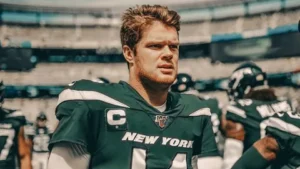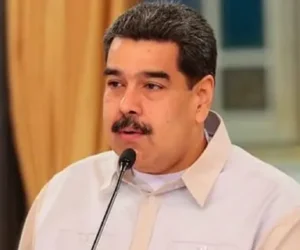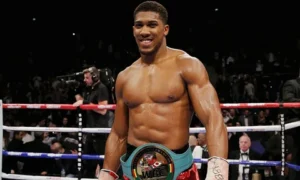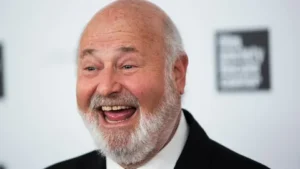Let me tell you something about Rufai Oseni that’ll probably surprise you – he didn’t study journalism. Not a single day in journalism school. Yet here he is, one of the most recognized faces on Nigerian television, interviewing presidents, grilling politicians live on air, and making headlines himself. That’s either genius or madness, depending on who you ask.
I’m going to walk you through the real story of how a guy who studied Animal Anatomy and Physiology became one of Nigeria’s most talked-about broadcast journalists. This isn’t your typical rags-to-riches story. It’s messier, more interesting, and honestly, more controversial than that.
The Odogbolu Boy Who Wasn’t Supposed to Be Here
Rufai Oseni was born on April 8, 1980, in Odogbolu, Ogun State, Nigeria. Now, if you know anything about Odogbolu, you know it’s not exactly the entertainment capital of Nigeria. It’s a quiet town in Ogun State where most young people dream of becoming engineers, doctors, or lawyers – not confrontational television hosts.
Born to Yoruba parents who were both businesspeople, young Rufai split his childhood between the bustling streets of Lagos and the rural environment of Odogbolu. That combination is important because it gave him street smarts from Lagos and the grounding humility from small-town life. You need both to survive Nigerian media.
Here’s the part that shaped him more than anything: his mother died when he was young, and his father passed away in August 2022. Losing your mother early changes you. It forces you to grow up faster, take life more seriously, and develop a thick skin. Those qualities? They’re exactly what you see when Rufai is on screen, refusing to back down from powerful politicians.
The Education Path Nobody Expected
So what did this future controversial journalist study? Animal Anatomy and Physiology at the Federal University of Agriculture, Abeokuta (FUNAAB). Yes, you read that right. While at FUNAAB, he wasn’t just studying animal organs – he was Vice President of the Association of Nigerian University Science Students (ANUNSA) and already dabbling in radio.
His father, interestingly, never wanted him in science. According to Rufai himself, his dad wanted him to study arts and languages because he saw his son’s strength in communication. Turns out dad was right. Rufai has often joked about this, saying his father would always remind him, “I told you so.”
But he didn’t stop at his science degree. In 2018, Rufai obtained a Certificate in Entrepreneurship Management from Lagos Business School, Pan-Atlantic University, where he served as class secretary. Between 2016 and 2017, he also became a Change Management Practitioner through the Institute of Change Management Nigeria, studying things like the Prosci method and Adkar modeling.
So while critics love pointing out his lack of journalism credentials, they conveniently ignore that he’s actually well-educated – just not in journalism. And honestly? That might be exactly why he approaches interviews differently than traditional journalists.
From Radio Booths to National Television
Rufai Oseni biography would be incomplete without understanding his media journey. He didn’t start at the top. Nobody handed him a prime-time slot because of connections. He ground it out through various radio stations across Nigeria.
His media career began at Next Magazine between 2007 and 2010, where he worked as an editor. Then came the radio circuit – JFM Radio in Warri, Unique FM in Ilesa, Gold FM, and Inspiration FM. Each station was a stepping stone, each show a learning experience. He was building skills, developing his voice, learning what works and what doesn’t.
Between 2010 and 2013, he also did sports analysis for Ogun State Television (OGTV). Sports commentary teaches you to think fast, analyze quickly, and speak confidently without a script. All skills that would serve him well later.
The big break came in 2019 when he joined Arise TV. His morning show quickly became one of the most-watched programs on Nigerian television, not because it was easy viewing, but because it was uncomfortable viewing. Rufai made guests squirm. He fact-checked live. He interrupted when he smelled nonsense. Traditional? No. Effective? Absolutely.
The Arise TV Phenomenon: Love Him or Hate Him
Let’s talk about what makes Rufai’s style so divisive. His Arise TV morning show is prime-time television, and he’s turned it into something between a news program and a courtroom trial. Politicians who agree to appear on his show know they’re walking into fire, not a friendly chat.
His interview style is confrontational, aggressive even. He interrupts. He challenges. He fact-checks in real-time. When a politician says something questionable, Rufai doesn’t nod politely and move on – he stops them right there and demands clarification or evidence.
Critics say he’s rude, unprofessional, pursuing an agenda. Supporters say he’s asking the tough questions other journalists are too scared or too compromised to ask. The truth? Probably somewhere in between.
The most infamous moment came in 2023 during his interview with Jesutega Onokpasa about fuel subsidy removal. When Rufai questioned the logic of removing subsidies during a cost-of-living crisis, Onokpasa famously shot back: “Listen Rufai! This is not animal psychology. If you want to be a journalist, you can be a journalist.”
That “animal psychology” jab – referring to Rufai’s educational background – became instant viral content. And here’s what’s interesting: instead of backing down or being embarrassed, Rufai wore it like a badge. He’s mentioned it multiple times since, almost owning the controversy.
The Controversies That Define Him
If you’re looking for a squeaky-clean Rufai Oseni biography, you’re reading the wrong article. The man attracts controversy like a magnet attracts metal.
In August 2022, he was charged, found guilty, and fined 70,000 naira for driving in a Lagos BRT lane. Now, most public figures would handle this quietly. Rufai? It became a whole media situation. Some defended him, others called out the hypocrisy of a journalist who questions others breaking rules.
In 2022, he had an on-air clash with Reno Omokri that got heated enough for threats to be exchanged. In February 2025, during an interview with Daniel Bwala (Special Adviser to President Tinubu), things got so tense that Bwala threatened to walk out.
These aren’t one-off incidents. They’re a pattern. Rufai’s interview style consistently creates moments where guests feel attacked, where tensions rise, where the line between tough journalism and confrontation gets blurred.
Critics, including some within the journalism profession, have written extensive pieces questioning his methods. Dele Elempe wrote a detailed critique in Premium Times pointing out Rufai’s lack of traditional journalism training and his confrontational style that makes guests uncomfortable rather than eliciting information.
But here’s the thing – this controversy is also what makes him effective. In a media landscape where too many journalists are compromised, scared, or too polite, Rufai’s aggressive approach cuts through the noise.
Beyond the Screen: The Entrepreneur and Mentor
What most people don’t know about Rufai Oseni is that he’s not just a broadcaster – he’s a full-blown entrepreneur with multiple business interests.
He’s the CEO and Director of NEO Media Group, an emerging pan-African media company. He co-founded Loyalbonus.com, an e-commerce platform. He provides advisory services to various tech companies across Nigeria. The guy who studied animal anatomy has his fingers in technology, media, and entrepreneurship simultaneously.
But here’s what’s really impressive: Rufai has mentored over 5,000 Nigerian students across universities. That’s not a typo – five thousand students. He’s mentored successful startups including Pass.ng, Techpoint, and Loyalbonus. He’s worked closely with the federal government’s Ideas Hub incubator, helping raise capital for businesses.
He’s been a featured speaker at some serious institutions – Judge Business School at Cambridge University, University of Sussex in Brighton, and various other international platforms. A Nigerian broadcaster with no formal journalism degree speaking at Cambridge? That’s not luck. That’s expertise recognized globally.
In November 2023, he started the Oseni Center, a library and development center in his village in Odogbolu. He’s also helped train over 20 teachers through the One Million Teachers platform. So while he’s making headlines for confrontational interviews, he’s quietly building infrastructure and mentoring the next generation.
The Awards and Recognition
Despite (or maybe because of) his controversial style, Rufai Oseni has racked up some serious recognition. In 2023, he won the Social Media Awards as the “Most Engaging Journalist on Social Media.” He also received the “Most Courageous TV Host Award of the Year” from Igbere TV Leadership Awards.
At the Nigeria Media Nite-Out (NMNA) Awards 2022, he won On-Air-Personality of the Year. He’s been named Chairman of the Sportsville Special Recognition Awards for the 2025 edition. These aren’t small-time awards from obscure organizations – these are industry recognitions that matter.
He’s also served as a BBC Bristol Analyst on African issues, demonstrating that his perspective is valued beyond Nigerian borders. His analytical skills and commentary on African affairs have contributed to deeper understanding of the continent’s challenges internationally.
The Books Nobody Talks About
Here’s another dimension to Rufai that gets overlooked: he’s an author. He’s written books including “Veritas: The Tale of a Sleeping Giant” and “Eureka.” Both are available on Amazon, and both deal with themes of development, leadership, and Africa’s potential.
Writing books while maintaining a demanding television schedule, running businesses, and mentoring thousands of students? That’s not just ambition – that’s almost obsessive productivity. The man operates at a pace most people can’t sustain.
The Private Life He Guards Fiercely
Now let’s address what everyone wants to know but Rufai refuses to discuss publicly: his personal life. As of 2025, his marital status remains unclear. Various sources speculate he’s married, some say he’s in a relationship, but there’s no confirmed information about a wife or children.
He keeps family details completely private. No photos with a spouse, no mentions in interviews, no social media posts about his romantic life. In an era where celebrities overshare everything, this level of privacy is remarkable.
What we do know is he’s a Christian. There are photos of him with Pastor Kumuyi of Deeper Life Church, indicating his faith is important to him. His social media occasionally references his faith, but even there, he maintains boundaries.
His 2022 tribute to his late father in ThisDay newspaper revealed a deep bond, calling his dad his “best friend, confidant, and ally.” That vulnerability shown in honoring his father contrasts sharply with his tough-guy television persona.
The Physical Transformation
Here’s something interesting that shows Rufai’s discipline: he underwent a significant weight transformation, dropping from 121kg to 98kg. Standing at 5’6″ tall, that weight loss represents serious commitment to health and fitness.
He occasionally shares workout routines on social media, showing another side of his personality – the disciplined, health-conscious side that exists alongside the confrontational journalist persona. That transformation from 121kg to 98kg isn’t just about appearance – it’s about the same drive and determination he applies to everything else.
The Net Worth Question
Let’s talk money. Estimates place Rufai Oseni’s net worth between $500,000 and $700,000 USD as of 2025. Some sources suggest it could be lower, around $100,000, but given his multiple income streams, the higher estimate seems more realistic.
His wealth comes from diverse sources: salary from Arise TV, fees from global speaking engagements, income from NEO Media Group, revenue from Loyalbonus.com and other business ventures, consulting fees for tech companies, and MC and event hosting fees.
He owns a Range Rover and property in Lagos, indicating comfortable financial standing. But what’s interesting is he’s not flaunting wealth like many Nigerian celebrities. He’s relatively modest in his displays despite having the means to show off.
For someone who’s only been in mainstream television since 2019, building a net worth potentially approaching three-quarters of a million dollars shows serious business acumen beyond just his broadcasting career.
The Technology Enthusiast Angle
One aspect of Rufai Oseni biography that gets overshadowed by his journalism work is his genuine passion for technology. He’s not just dabbling – he’s actively involved in Nigeria’s tech ecosystem.
He’s been a mentor at Ideas Hub, chaired various technology conferences across Nigeria, and consistently advocates for using technology as a tool for national development. His co-founding of Loyalbonus.com isn’t just an investment – it’s him putting money where his mouth is regarding e-commerce and digital solutions.
He maintains strong entrepreneurial contacts in Europe, particularly in Paris, showing he’s building international networks beyond just African markets. That global perspective informs his journalism and his business decisions.
The Criticism He Can’t Escape
Let’s be real about the elephant in the room: many journalism professionals don’t consider Rufai Oseni a real journalist. The critique isn’t just about his educational background – it’s about his methodology.
Traditional journalists argue that effective interviewing requires making guests comfortable enough to share information. Rufai’s confrontational style often does the opposite – it makes guests defensive, combative, and less likely to reveal anything meaningful.
Critics point out he interrupts too much, doesn’t allow guests to complete their responses, appears to pursue an agenda rather than seeking truth, and prioritizes creating viral moments over gathering information. The accusation of “sensationalism” isn’t just name-calling – it’s a substantive critique of his approach.
When he tells guests “you can leave if you want” during tense interviews, traditional journalists cringe. That’s not how you handle an interview. You deescalate, redirect, rephrase – you don’t invite your guest to walk out.
The fact-checking in real-time, while seemingly good journalism, can also come across as gotcha journalism designed more to embarrass than to inform. There’s a fine line between holding people accountable and performing for the cameras.
Why He Works Despite Everything
So if Rufai Oseni breaks so many rules of traditional journalism, why is he successful? Why do millions tune in to watch him? Why do politicians still agree to appear on his show despite knowing they’ll get grilled?
Here’s my theory: In a country where corruption is endemic, where politicians lie with straight faces, where traditional journalism often fails to challenge power, Rufai’s confrontational style feels cathartic to regular Nigerians. He’s saying what millions of frustrated citizens want to say to their leaders.
Is it always professional? No. Is it always fair? Debatable. But is it effective at cutting through political spin and double-speak? Absolutely. And in the Nigerian context, where too many journalists are compromised or intimidated, that matters more than traditional credentials.
His lack of journalism school training might actually be an advantage. He’s not constrained by conventions about how interviews “should” be conducted. He’s approaching it fresh, based on what he thinks works, not what textbooks say should work.
The Global Speaking Career
Beyond Nigerian television, Rufai Oseni’s influence extends internationally through his speaking engagements. He’s spoken at Cambridge University’s Judge Business School, University of Sussex in Brighton, and various other international forums.
His topics typically center on African development, entrepreneurship, media’s role in democracy, and technology as a tool for progress. The fact that prestigious universities invite him speaks to his perceived expertise beyond just his controversial television persona.
He’s also been active during Global Entrepreneurship Week at Lagos Business School, sharing his entrepreneurial journey and mentoring approach. That combination of media presence and business acumen makes him a valuable speaker for audiences interested in African opportunities.
The Legacy Question at 45
As of 2025, Rufai Oseni is 45 years old, turning 45 on April 8, 2025. That’s relatively young for someone with his level of influence and recognition. Which raises an interesting question: what does the next chapter look like?
He’s been in mainstream television for about six years, built multiple businesses, mentored thousands of students, written books, spoken globally, and become a household name. But is this the peak, or is he building toward something bigger?
Some speculate he might transition fully into entrepreneurship, using his media fame as a platform to scale his businesses. Others think he’ll continue pushing boundaries in journalism, possibly expanding beyond Nigerian borders to continental or even global platforms.
There’s also the possibility of political ambitions, though he’s been careful to position himself as a journalist who questions all politicians, not just those from one party. But in Nigeria, that kind of profile and recognition often leads to political offers.
What His Critics and Supporters Both Miss
Here’s what I think both sides get wrong about Rufai Oseni: Critics focus too much on his lack of formal journalism training and miss that he’s actually doing important work holding power accountable. Supporters, meanwhile, sometimes defend problematic interview tactics just because they like his targets.
The truth is more nuanced. Rufai is simultaneously a flawed journalist using questionable methods AND an important voice challenging political corruption and incompetence. Both things can be true at once.
His educational background in animal physiology isn’t the liability critics make it out to be, but it also doesn’t give him a free pass on professional standards. His confrontational style sometimes gets important admissions from powerful people, but sometimes it just creates heat without light.
He’s a complex figure operating in a complex media environment where traditional rules often fail to produce meaningful accountability. So he’s making up new rules, and we’re all watching to see if they work.
The Bottom Line on Nigeria’s Most Controversial Journalist
Rufai Oseni biography is ultimately a story about someone who succeeded by ignoring the conventional path. No journalism degree? Doesn’t matter. No traditional media training? Irrelevant. Breaking interview conventions? Actually working in his favor.
At 45, with over 1.1 million Twitter followers, a successful television show, multiple businesses, thousands of mentees, international speaking gigs, and books published, it’s hard to argue he hasn’t figured something out – even if that something defies traditional journalism wisdom.
Will he be remembered as a great journalist or a controversial figure who prioritized conflict over clarity? Honestly, probably both. And maybe that’s exactly what Nigerian media needed at this moment – someone willing to be messy and confrontational in pursuit of accountability, even if the methods aren’t always pretty.
Love him or hate him, you can’t ignore him. And in the attention economy of modern media, that might be the most important thing of all.








